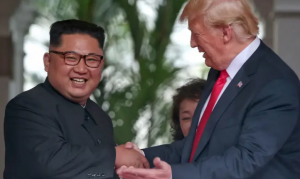
During the first presidential debate in 1960, Senator John F. Kennedy explained his view that the struggle between the United States and other liberal democracies against communist Russia and China could only be won through economic prosperity in the West and the example that the US. and its allies would set for the world.
For much of the next 40 years Kennedy would be proven correct due to the prosperity of the West and what came to be called the Washington Consensus dominated the world spreading free-market capitalism and some form of elected government to many countries.
Along the way, the Soviet Union collapsed under its own mismanagement and inability to provide such prosperity to the citizens of Russia and the Eastern block.
As the USSR faded, China began what would be its economic, political, and geopolitical revival under the leadership of Deng Xiaoping. Deng’s legacy would be pursued by a series of Chinese leaders including its present Premier Xi Jinping.

After the financial crisis of 2009, the endless war in Afghanistan, and the disastrous situation in post-war Iraq, however, the idea that the United States was the model for the rest of the world has become an open question. Restored, to some degree, under the leadership of Barak Obama, Donald Trump has eroded the image of the United States in the rest of the world by turning his back on traditional and new American allies, coddling dictators such as the North Korean Kim Jon Un and Russian President Vladimir Putin, and allowing hundreds of thousands of Americans to die from SARS-CoV-2.
As the world enters the 2020s, the Chinese example seems to offer a counterpoint to the United States for countries across Asia and Africa. China’s One Belt, One Road initiative offers investment capital for infrastructure projects and Chinese companies offer their equipment and services backed by low-interest loans from the Chinese Development Bank and other institutions. China has controlled the virus and its economy is back on track.
The other beacon of liberal democracy, The European Union is deeply struggling with its own issues, the virus, and the exit of the United Kingdom from the Union.
At the same time, there are a number of critical situations around the world including:
- Tensions in the South China Sea and the East China Sea
- Ongoing tensions between North Korea and the United States
- The conflict between India and Pakistan and India and China
- Ongoing war in Afghanistan
- The conflict between Iran and Saudi Arabia and the United States
- The conflict between Armenia and Azerbaijan
- Political instability in Iraq, Egypt, and Lebanon
- The Israeli – Palestinian conflict
- Civil War in Libya
- Civil war in Syria
- Tensions between Turkey and Rojava, the Kurdish state in Northern Syria
- Civil war in South Sudan
- War int he Eastern Ukraine
- Armed groups such as Boko Harum in Nigeria and Al-Shahab in Somalia
- Violence in the DRC
- Institutional conflict in Venezuela
- Criminal violence in Mexico
As if all of this was not enough, the world faces the very real threat of climate change which requires concerted action by all of the countries involved and the United States and China in particular.

The historian Niall Ferguson says that we are already in the middle of cold war 2.0 between the U.S. and China and the former Dean of the Harvard Kennedy School, Graham Allison, published a book recently asking if the U.S. and China were destined for war?
The next few years will be critically important on a number of issues and the role of the United States, and whoever turns out to be its president from 2021 – 2025 will certainly be decisive.
Four more years of Donald Trump will further erode the United States’ standing in the world as he continues to pursue his zero-sum version of realpolitik. A Biden presidency, on the other hand, would stress multilateral solutions to the world’s problems and bring the U.S. closer to its traditional allies in Europe, Asia, The Middle East, and Africa.

